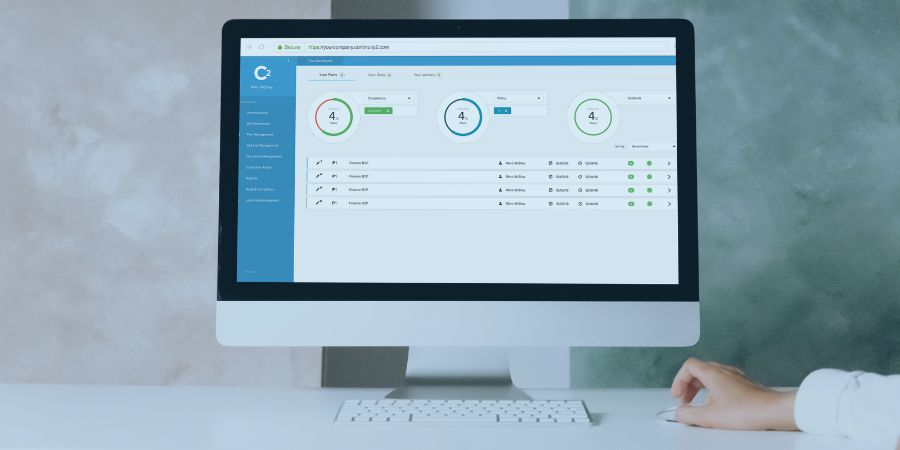Jump to a section
When preparing for operational disruptions in your business, there is no such thing as one size fits all. Every organisation is unique, and so are the potential risks you could face.
Case in point: the global pandemic. This event had a significant impact on many businesses worldwide. For example, one business could thrive in this situation, but many suffered a great deal of loss, eventually being forced to close down their business.
How do you ensure that you can continue operating in the face of potential disruptions and unexpected events like the pandemic? Your ability to quickly adapt, showcase resilience in front of your customers, and ensure that any potential threats causing intolerable harm to the entire organisation come down to operational resilience. And to ensure business resilience, you have to prioritise business continuity planning.
Many organisations commit the mistake of assuming that operational resilience and business continuity are the same. However, they serve different roles, which you'll find out here.

What is Operational Resilience?
Operational resilience refers to an organisation's ability to maintain its core functions and business processes in the face of disruptive events and changing environments. Building business resilience begins by identifying the core aspects of business operations and staying operational, to some extent, despite all the challenges facing the organisation and enabling it to deliver value to its customers.
There are several steps to achieve operational resilience, focusing specifically on responding effectively in the face of unexpected disruption. This can be considered part of crisis response management to ensure that the core business functions remain operational and have a manageable impact on the entire organisation.
What is Business Continuity?
Business continuity refers to an organisation's ability to recover from potential disruption and recover operations in the shortest amount of time. Continuity planning involves various elements, including risk assessment and risk management. The first step in developing your business continuity plan is identifying risks that could directly impact and cause significant disruption to your business operations.
Most organisations take a generic approach to continuity planning. However, the most effective continuity plans are those that identify specific scenarios and risks and plan how to effectively respond to each scenario. This plan ensures that you can inform the decision-making process and quickly adapt to the changing environment brought on by disruptive situations. The goal for business continuity is to minimise downtime or avoid downtime, if possible.
Operational Resilience vs Business Continuity: What's the Difference?
Operational resilience vs business continuity is one of the biggest question marks for anyone tasked with business continuity plans. While they are related concepts, organisational resilience and business continuity serve different purposes.
It would be fatal for the entire organisation to assume they are completely the same thing.
Before you can map out your disaster recovery plans, you must identify the differences between operational resilience and business continuity.
Proactive vs Reactive Approach
The main point of distinction between operational resilience and business continuity is the approach to crisis response. Business continuity implements a reactive approach, wherein it builds a plan to respond quickly to any significant disruption to the entire organisation.
On the other hand, operational resilience is about taking a proactive approach. It defines the steps that an organisation must take to prevent operational disruptions. It also consists of building strategies that enable your business to become operationally resilient, meaning that it is flexible enough to face all the challenges and adapt quickly without failure. Flexibility in light of disruption is a critical attribute for any organisation because it ensures that you can stand up to any risks without breaking.

Possibility vs Actuality
Another major difference between operational resilience and business continuity is the perception of disruptive events. Business continuity planning is about the cost-benefit analysis. You develop business continuity plans to come up with integrated solutions after identifying potential risks in case it happens.
On the other hand, operational resilience expects a disruptive event to happen it's just a matter of when (also known as the Black Swan Concept). Hence, there is no need to activate the business resilience strategies. It is already embedded into how the business operates and functions to ensure that you remain operationally resilient, even as the environment or situation changes.
With a business continuity plan, the solutions you have in place are only activated once there is a disruptive event.
It is worth noting that resilience does not always mean that all business units will remain operational following a disruption. It acknowledges that only those critical aspects of the organisation, such as the financial sector or customer service department, will continue operating as the rest of the organisation manages to restore and recover from disruptions.

To achieve operational resilience, you must work on identifying and safeguarding the critical processes of your business. In doing so, you can implement workarounds and integration solutions to maintain your competitive advantage even when facing an unexpected disruption, regardless of the type or severity.
Long-Term Goal
From the outside, operational resilience and business continuity planning appear to have the same goal; to protect the business and continue to deliver products or services in spite of disruptions. However, there are some nuances in the differences between the two approaches.
The long-term goal of building operational resilience is to protect an organisation's reputation and long-term viability. Maintaining operations for your key business functions exemplifies resilience to your business partners. It showcases your ability to remain flexible despite unexpected events. Through this flexible nature, a business can withstand any disruptive events or prevent any event from escalating into something more significant.
On the other hand, the purpose of business continuity management is to minimise the potential impact of a disruptive event. Hence, business continuity must work closely with business impact analysis to ensure that you can address these events in the most effective manner. The goal is to maintain the confidence and trust of your customers.

Broad vs Specific Risk Management
Lastly, the main difference between operational resilience and business continuity is their approach. Operational resilience is a broad concept and an ongoing effort. The goal is to build resilience so your business can withstand any disruption. It requires continually assessing the current strategies and solutions, and business continuity is part of that.
Meanwhile, continuity management is more specific. It identifies risks and builds a plan around those specific risks and scenarios. This type of planning is integral to your effort at disaster recovery.
Does Operational Resilience Replace Business Continuity?
Business continuity falls under the umbrella of operational resilience as far as disaster recovery planning is concerned. So, the question is, is business continuity management still necessary? Will operational resilience be enough?
The answer is no. While these are two different concepts, one is not inferior to the other. As mentioned above, they have specific functions and goals. Therefore, you need each one to ensure the resiliency of your business.
There are aspects wherein they become interdependent with each other. For instance, you need robust business continuity management to enable operational resilience strategies. Without business continuity, an organisation's key assets and core business functions won't work or will become partially disabled.
The continuity planning process helps manage daily risks and potential threats to businesses. However, without operational resilience, the ability to activate continuity planning is strongly limited, especially for more severe disruptions.

How to Get Started on Business Resilience
The next action plan is to identify the steps to achieve operational resilience. The list below provides a best practice guide to help maintain the well-being of organisations and ensure continuity as you adapt to any disruption.
- Conduct a thorough risk assessment to determine threats and sources of disruption that could negatively impact your business operations.
- Build a comprehensive business continuity plan that details the various types of disruption and how to ensure you can stay operational.
- Identify your communication protocols during disruptions and how to respond quickly by keeping your employees, human resources, and stakeholders in the loop.
- Provide proper training for your employees to have a solid crisis response and ensure they can adapt to their designated roles and responsibilities.
- Maintain a solid relationship with key suppliers. Build a contingency plan to ensure that you have access to critical goods and services linked to your business operations.
- Form a crisis management team that focuses specifically on managing disruptions and continuity planning.
- Invest in business continuity tools to maintain critical business functions.
- Regularly test and review your business continuity management plans and operational resilience strategies. They must be updated to ensure they are relevant and effective.

On a Final Note
Business continuity is committed to planning for the worst using a crisis management approach. As the famous quote from Benjamin Franklin goes, failing to plan is planning to fail. Whether it's a small problem, such as a localised network disruption, or a major one, like a global pandemic, having a plan enables your team to inform the decision-making process during critical moments.
On the other hand, operational resilience is about empowering your long-term success as a company. Organisational resilience in businesses means that you are prepared to tackle any challenges that come your way, transcending the immediacy of a short-term disruptive event. This makes resilient businesses less susceptible to harm and long-term damage.
Both continuity planning and organisational resilience are valuable tools that organisations should have. The operational resilience requirements and continuity plans might differ, but they should not be seen as competing strategies. Instead, they support each other as they work toward helping organisations thrive in any situation.
C2 has worked together with some of the largest financial institutions in the world to create a comprehensive Business Continuity Management Software solution that automates FCA/PRA Compliance and enhances Operational Resilience. C2 Meridian provides organisations with an intuitive, efficient and effective process for identifying, analysing, and safeguarding their critical business services.
Book a demo today to see the module in action.
Written by Richard McGlave
Founder & CEO at Continuity2
With over 30 years of experience as a Business Continuity and Resilience Practitioner, Richard knows the discipline like the back of his hand, and even helped standardise BS25999 and ISO 22301. Richard also specialises in the lean implementation of Business Continuity, IT Service Continuity and Security Management Systems for over 70 organisations worldwide.


Written by Richard McGlave
Founder & CEO at Continuity2
With over 30 years of experience as a Business Continuity and Resilience Practitioner, Richard knows the discipline like the back of his hand, and even helped standardise BS25999 and ISO 22301. Richard also specialises in the lean implementation of Business Continuity, IT Service Continuity and Security Management Systems for over 70 organisations worldwide.